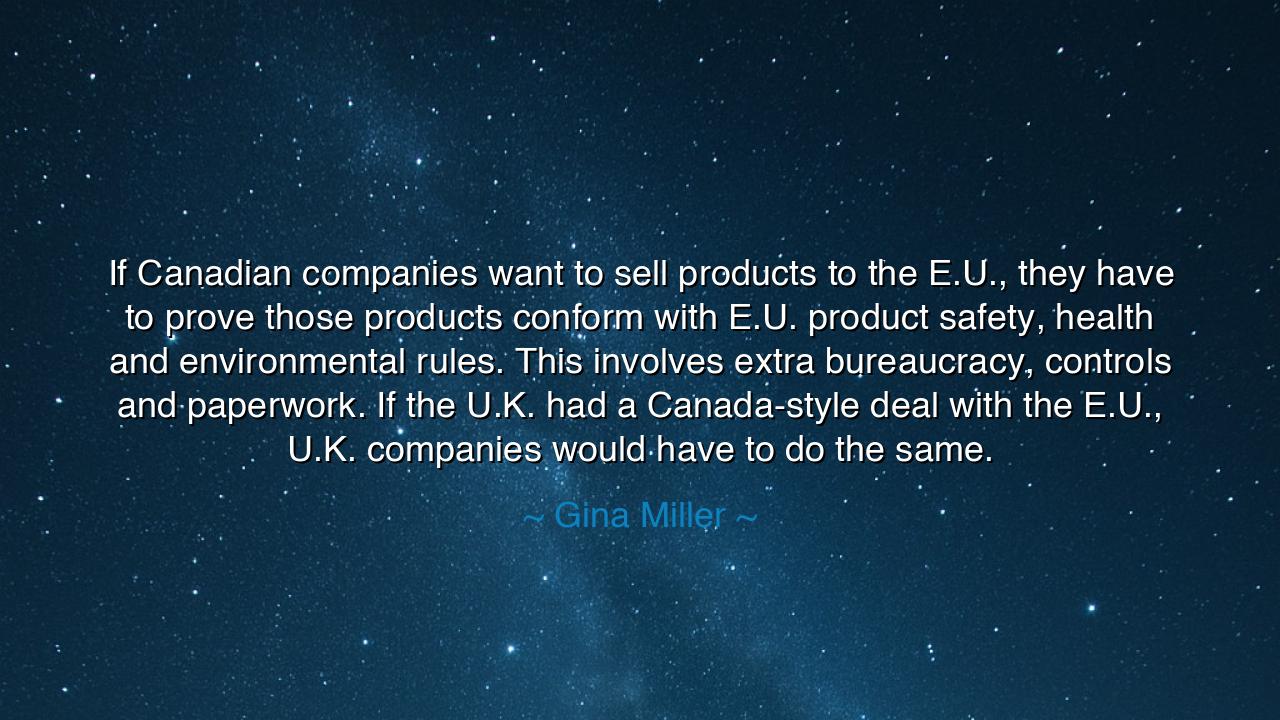
If Canadian companies want to sell products to the E.U., they
If Canadian companies want to sell products to the E.U., they have to prove those products conform with E.U. product safety, health and environmental rules. This involves extra bureaucracy, controls and paperwork. If the U.K. had a Canada-style deal with the E.U., U.K. companies would have to do the same.






Hear the measured words of Gina Miller: “If Canadian companies want to sell products to the E.U., they have to prove those products conform with E.U. product safety, health and environmental rules. This involves extra bureaucracy, controls and paperwork. If the U.K. had a Canada-style deal with the E.U., U.K. companies would have to do the same.” Though her tone is practical and grounded, the wisdom within is profound, for it speaks of the hidden costs of sovereignty, of the unseen burdens that come when nations walk apart rather than together.
The meaning of this quote lies in the recognition that trade is not merely an exchange of goods, but a covenant of trust. When a nation such as Canada seeks to sell into the vast market of Europe, it must prove—line by line, form by form—that its products meet the standards of safety, of health, of care for the earth. This is the price of access, and though it appears as endless bureaucracy, it is in truth the scaffolding upon which trust is built. Miller’s warning is clear: if the U.K. chooses the same distant path, it too must bear these burdens, for no nation escapes the demands of trust.
History gives us countless examples of this truth. In the days of the Silk Road, merchants who carried spices, silk, and jewels across continents were required to present seals of authenticity, to prove their goods were untainted and their measures honest. Without such assurances, distrust festered, and trade faltered. In like manner, the modern E.U. demands conformity with its rules, not to punish outsiders, but to preserve the integrity of its market. The lesson of ages remains the same: without shared standards, trade becomes chaos, and chaos breeds ruin.
Consider also the aftermath of the American Revolution. The new republic rejoiced in freedom, but when it sought to trade with Europe, it found itself bound by tariffs, inspections, and endless negotiations. Independence gave sovereignty, but at the cost of simplicity. Only when new treaties were forged, and trust rebuilt, could trade flow freely once again. This tale mirrors Miller’s words: sovereignty may seem a triumph, but it brings with it the burden of paperwork, controls, and endless bureaucracy.
Miller’s statement is also a rebuke to illusions. Many believed that a Canada-style deal would mean freedom from the rules of Europe, a loosening of chains. But she unveils the deeper truth: the rules do not vanish, they simply shift to the border, enforced with greater scrutiny. The standards of the E.U. remain unmoved, and companies must bend to them regardless. Thus, her words remind us that independence without foresight can be an illusion, and that freedom without responsibility is but another form of bondage.
The lesson for us is this: in both commerce and life, every choice carries unseen costs. To join is to yield some sovereignty, but to leave is to accept the burden of proving oneself anew. The wise do not seek only the joy of freedom, nor only the ease of union, but weigh carefully the scales of trust and responsibility. Only then can they walk a path that does not crumble beneath them.
Practical action lies before nations and individuals alike. For nations, it means facing the reality that cooperation demands compromise, and separation demands proof. For individuals, it means recognizing that trust, once broken, must be earned again through diligence and transparency. Support leaders who tell the truth about these burdens, and reject those who promise ease where there is none. For in honesty lies strength, and in foresight lies survival.
Thus let Gina Miller’s words be remembered not as mere commentary on trade agreements, but as timeless counsel. Bureaucracy, though tiresome, is the visible form of trust. Standards, though heavy, are the guardians of health, safety, and the earth itself. And whether for a merchant in the bazaars of old or a company in the markets of today, the truth endures: no trade is free, but all trade is built upon the sacred weight of responsibility.






AAdministratorAdministrator
Welcome, honored guests. Please leave a comment, we will respond soon